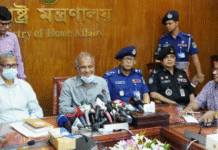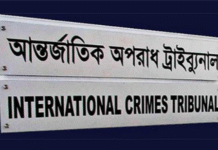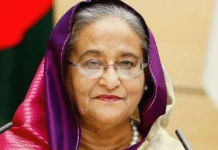By Ahammad Foyez on Dec 08, 2021 
A Dhaka court sentenced 20 student members of the ruling party’s youth wing to death and five others to life in prison Wednesday for fatally beating a fellow student at a prestigious engineering school because he had criticized the government online.
The 25 used cricket bats and other objects to beat to death Abrar Fahad, a student at the Bangladesh University of Engineering and Technology (BUET), in a residential hall in October 2019 after he posted comments via Facebook that were critical of Prime Minister Sheikh Hasina’s government, according to authorities.
University campuses in Bangladesh are an arena for boisterous debate between youth wings of rival political parties, but this can turn violent.
“This incident has stunned the whole nation. The maximum punishment has been given to the accused to prevent the recurrence of the brutal murder,” ruled Judge Abu Zafar Md. Kamaruzzaman of the Dhaka Speedy Trial Tribunal.
The judge said the suspects had spread rumors that Abrar had been a member of Islami Chhatra Shibir, the student wing of Jamaat-e-Islami party, which worked against Bangladesh during the country’s war of independence from Pakistan in 1971.
A second-year student in electrical engineering at BUET, Abrar was beaten on Oct. 7, 2019, by the members of the Chhatra League, the student wing of the Awami League party.
His killing ignited protests on campuses across the country.
Three of the defendants absconded following the incident while the others have been jailed since shortly after the attack.
“The prosecution was successful in proving their guilt beyond doubt resulting in appropriate punishment for them,” Prosecutor Abdullah Abu Bhuiyan said. “The killing of Abrar was brutal and tragic. Now the destiny of these 25 students, who are guilty, is also a tragedy, though they deserve this.
“This example tells us that none should commit such crimes so no one faces such consequences in the future. No parents should lose their beloved children in this way.”

Abrar’s father attended the sentencing and spoke to reporters afterward.
“We are primarily satisfied, but our full satisfaction will come after the execution. This verdict should be upheld by the High Court. Abrar’s soul will be at peace if the verdict is executed,” Barkat Ullah said.
The verdict proves that the rule of law has been met, Law Minister Anisul Huq said.
“From now on, no offender can move freely after committing such an incident of killing,” he told reporters during a press conference at his home.
“The case documents will reach the High Court within seven days. Our government will help all the way to its speedy disposal,” he said.
Relatives of the defendants, meanwhile, challenged the verdict.
“I handed my son over to the police on my own, I respect the law. But, I did not expect this verdict – mass executions and life imprisonment were given,” said Rabiul Islam, whose son, Morshed Amartya Islam, was sentenced to death. “We are shocked. I was not ready for such a verdict.
“The murder happened incidentally. None of them is a professional criminal. Everyone is a meritorious student. We will go to the High Court,” Rabiul said.
The mother of one of the five sentenced to life in prison expressed similar concerns.
“Amit was arrested and implicated in the case due to pressure from the media. He was given a life term due an allegation that he talked with the accused in messenger,” Devi Rani said about her son, Amit Saha. “We expected Amit to be released.”
Satya Prasad Majumder, the university’s vice chancellor, praised the verdict.
“A strong message will be disseminated through this verdict that the highest punishment awaits anyone committing such an offense in educational institutes. I believe it will reduce the torture of students in the residential halls to some extent,” he told journalists.
Muhammad Mahbubur Rahman, an instructor in Dhaka University’s law department, said death sentences had increased recently in high-profile cases, only to be overturned by higher courts.
“Even if we do not discuss whether there should be a provision for the death penalty or not, it will be seen that there are many cases of death penalty in the lower courts of Bangladesh which are not upheld in the High Court. It seems that these judgments are being made to appease the people,” he told BenarNews.
“Even if the verdict is not upheld in the High Court, it will be seen that these accused will have to go through a lot of suffering. It is by no means desirable. Most of the judgments of the lower court should remain unchanged in the upper court, but here we have the opposite.”









